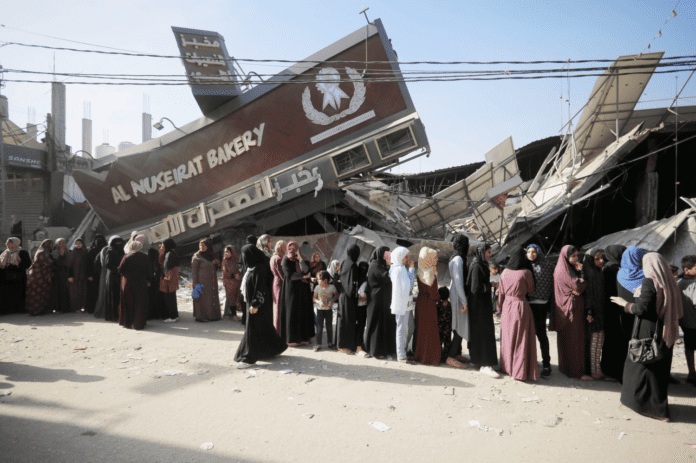Opinion by Moncef Khane
The United Nations Secretary-General António Guterres was the target of unprecedented verbal attacks from the Israeli ambassador to the United Nations, Gilad Erdan, after a meeting of the Security Council on Oct. 24, when he called on the UN leader to resign immediately. Standing next to his minister of foreign affairs, Eli Cohen, at the press stakeout afterward, Erdan accused Guterres of having “lost all morality and impartiality” and qualified the statement the secretary-general delivered moments earlier in the Council as “pure blood libel.”
Why? Because Guterres said after he “condemned unequivocally” the Oct. 7 attacks in Israel by Hamas militants, that they “did not happen in a vacuum” and that “the Palestinian people have been subjected to 56 years of suffocating occupation.” Minutes later, Cohen said he had canceled his scheduled meeting with the secretary-general later that day. Additionally, Israel’s war cabinet minister Benny Gantz posted on X, translated from Hebrew to English by Google: “Days when the United Nations Secretary-General supports terrorism are dark days for the world”; and “Whoever gives justification for terrorism is not worthy to speak for the world.”
The next day, Guterres expressed his shock at how his statement in the Council had been misrepresented “by some.” His self-evident statement hardly needed clarification, however, unless by so doing, he wanted to convey a subtle mea culpa to assuage Israel’s rage and demand that he resign unless he apologized.
Since then, the unrelenting bombardments of Gaza’s refugee camps, hospitals, residential buildings, UN schools, churches, mosques, bakeries, ambulances and fleeing civilians have killed nearly 10,000 Palestinians in the enclave in the last 30 days, as of this writing. That includes approximately 4,000 children, with thousands of them decomposing under the rubble.
But Guterres has been practically silent since then. He X’ed on Nov. 1 a picture of himself from the foothills of the Himalayas outside Kathmandu, thanking Nepal for its hospitality before flying onward to London to attend an AI “summit.” It was a summit by name only as it was not attended by heads of state or governments other than its host, Prime Minister Rishi Sunak.
So what was Guterres conveying while the Israeli-Palestinian conflict-hit an inflection point, with a possible regional war staring at us each day? Why travel to Kathmandu and London when his humanitarian workers were being killed?
On Nov. 3, Martin Griffiths, the UN humanitarian chief, struggled to contain his grief at a UN meeting when he spoke of 72 fellow staff members killed in Gaza, many of them with their families, dying at home. He noted that it was already the largest loss of UN personnel of any conflict, mostly Unrwa staff and that the death toll was increasing. (As of Nov. 6, it was 89 dead.)
In comparison, the 2003 bombing of the UN compound in Baghdad killed 22 UN personnel, including the head of the mission, Sérgio Vieira de Mello, who agonized for hours before dying under the rubble, just like thousands of Palestinian women and children in Gaza are suffering now, including UN humanitarian workers. The Baghdad attack provoked international outrage and shocked the UN and its leadership to its core.
Today, the UN’s top leadership has yet to demonstrate palpable outrage. At a press conference on Nov. 6, Guterres said, in a monochord voice while reading from a teleprompter, that he joined “the UN family in mourning 89 of our UNRWA colleagues who have been killed in Gaza.” Nor did he take questions from a roomful of journalists. There was not even a tepid condemnation of the killing of his fellow staff members from Guterres or the targeting of Unrwa facilities in Gaza, especially in the north.
The secretary-general has condemned Hamas repeatedly and demanded the release of the hostages the militants still hold. He has yet to condemn Israel for its indiscriminate bombings of civilians in Gaza, let alone for its assault on Unrwa schools, shelters and health care centers.
To date, Guterres has not called for a ceasefire, per se, but for a “humanitarian ceasefire,” which he didn’t do until Oct. 18, at least a week into Israel’s siege of the Palestinian enclave. A “humanitarian ceasefire” implicitly, and maybe perversely, suggests neutrality amid the continuing onslaught by Israel Defense Forces. It is an onslaught that in the view of eminent international jurists, such as former UN special rapporteur and Princeton University Professor Emeritus Richard Falk, steadily amounts to genocide and not merely collective punishment as is often depicted.
So it is unclear why the Palestinian ambassador to the UN, Riyad Mansour, would salute Guterres for being a hero recently, saying he is “maybe today the most popular man under the sun in all corners of the globe, including among the Palestinian people. . . .”
The only UN heroes are the humanitarian workers in Gaza, toiling relentlessly under hellish circumstances to help civilians stuck under constant heavy bombardments meant to kill. As for the secretary-general, unless he can find the rectitude to execute his office faithfully and forcefully, by calling first and foremost for an immediate and unconditional ceasefire and standing up for his staff, history will judge him harshly.
Moncef Khane is a former United Nations official. He served as political director of the Office of the Joint Special Envoy for Syria (2012-2014), as well as in peacekeeping missions and the Executive Office of Secretary-General Kofi Annan. He originally contributed this article to PassBlue.Com




